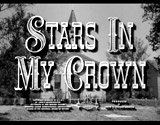
|
Stars in My Crown (1950)
In Jacques Tourneur's dramatic, faith-affirming family
picture and western - a film with its title taken from the hymn: "Will
There Be Any Stars in My Crown?":
- the opening credits, to the tune of the hymn "Will
There Be Any Stars in My Crown?" - sung by a church congregation
- with nostalgic remarks (and beginning of a long flashback) delivered
in the opening voice-over by the narrator, adult John Kenyon (Marshall
Thompson): "Do you hear that? You might say I was raised on
that song. Hearin' it takes me back, back to the old times when
I was young, back to Walsburg. According to the words of the song,
we're promised a city of gold in the hereafter. I used to think
that was a long time to have to wait. But I know now that there
is a city of gold right here on earth for every one of us - the
city of our youth. Walsburg's only one name for it, that's all.
Walsburg not as it is now, but as it used to be. I just have to
shut my eyes and I'm there. Nothing's changed. Even I haven't changed.
I'm always a boy in Walsburg. And there at my side, just as he'll
always be is the parson, Parson Gray. And passing before me are
all the people who are part of my growing up....Walsburg people.
Gone now, most of them, and yet as close to me still as people
in a favorite story - a story that had its beginning before I was
born, on the day the Parson arrived in our town. Of course, this
wasn't much of a town in those first hard years that followed the
War Between the States, but it suited the Parson right from the
minute he stepped off the train and started to look around. He
must have attracted plenty of attention as he walked down Main
Street for the first time in his brand new black pulpit coat and
faded gray cavalry breeches and his big old Bible in his hand,
but he just kept on walkin' til he got to Jerry Higgins' saloon.
He didn't have to call for quiet. It just followed him through
that room like a hounddog"
- the subsequent continuation of the flashback, to tell
the story of John's adoptive father: small-town gospel preacher Josiah
Doziah Gray (Joel McCrea) (who married Harriet (Ellen Drew)), and
started serving as the Parson in 1865 in the small post-bellum Southern
town of Walsburg, Tennessee; upon his arrival, Gray established himself
as the new Parson - reinforced by six-shooters during his announcement
and first sermon in the local saloon: "Boys, I'm your new preacher,
and I aim to give my first sermon right here and now! (He drew his
six-shooters in both hands) Thanks!"
- the bullying scene when town resident Perry Lokey
(Jack Lambert) whipped and tormented feeble-minded 'Chloroform' Wiggins
(Arthur Hunnicutt) - until Josiah Gray grabbed the whip, tripped
him by wrapping the whip around his legs, and sent him headfirst
into a deep mud puddle; everyone ended up laughing, as Gray delivered
a joke: "Perry puts me in mind of a colonel I had once. Never
learned to protect his rear"
- the powerful KKK lynch mob scene when freed black
Uncle Famous Prill (Juano Hernandez) was threatened by torch-carrying,
masked neo-Klansmen led by racist general store owner Lon Backett
(Ed Begley) ("who had a finger in every pie"), after Prill
refused to sell his neighboring property at 80 cents an acre (a rich
mining ore vein of mica was discovered on his property); earlier,
Prill's land and farm had been trashed, livestock scattered and crops
destroyed by Backett's unemployed workers-miners - to try to pressure
Prill
- the scene of Prill's defense by parson Gray, who bluffed
the lynch mob by pretending to read Prill's non-existent will (consisting
of Prill's generous promises to cede and bequeath his possessions
and land to each of the mob members upon his death) - [Note: the
scene was reminiscent of a similar stand-off sequence in To
Kill a Mockingbird (1962).] - Gray ended the reading with
the words: "You can have him now"
- the moment after the shamed and forgiving Klan members
had dispersed when it was revealed that the pages were blank by Gray's
young adopted son John Kenyon (Dean Stockwell): "There's no
writing on here. This ain't no will" - and Gray responded: "Yes
it is, son. It's the will of God"
|
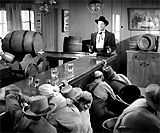
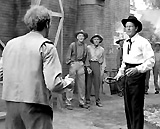
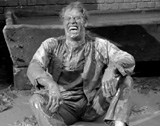

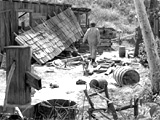
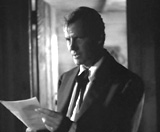
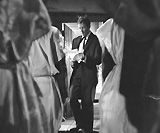
|








